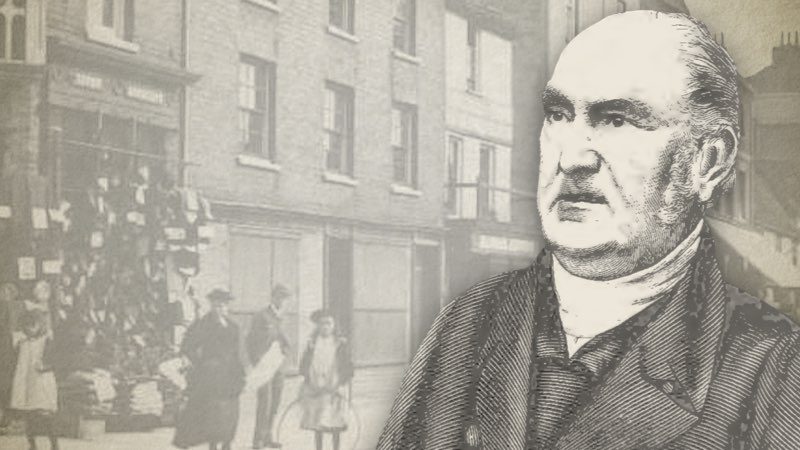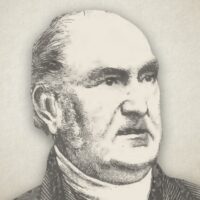
Christ Crowned
Notes Of A Sermon Preached By George Murrell, At The Brentford Anniversary On April 1st, 1861.
“On his head were many crowns.”—Revelation 19:12
I will tell you a secret, said the preacher. I preached a sermon from this text at Deptford, last June, and the reason of my choosing it to-night is, that it had been hanging about me for some time, and at this time I cannot get rid of it; I trust, therefore, it may be a blessing to many of you.
Our Lord is represented as riding on a white horse, having flashing eyes of anger; and I have no doubt but this passage will receive its accomplishment in the destruction of Popery. There is an undying glory arising from the salvation the dear Lord has effected.
Our Jesus is mighty to destroy all his foes, nor is he less mighty to bless all his people. The people of the Lord are crown wearers; but they cast their crowns at the feet of Jesus; the crowns which Jesus wears are his own crowns, those to which he has legal right, and of which not one believer would wish to rob the dear Lord. His church is a crown; she is his crown; he has wooed her; he has won her;—surely he shall wear her as his glorious crown: surely, believer, you will have nothing to say against an honor in which you have so deep an interest.
We have in this text, 1st, What is intended by Christ being crowned; and 2nd, we notice Som of those crowns which he wears.
I. Doubtless our Lord is represented as earring many crowns, to denote “His exclusive privileges.”
It is not anybody who many wear a crown; it is not anybody who can be a Saviour; he has a right to save, being the sent of the Father; he has power to bless, being “God over all, blessed forever,” and he comes, commended unto us by the precious fact, that he is Emmanuel, God with us.
1. Our Lord as represented here is so represented to show us his “exalted dignity.”
Once like his brethren, he mourned, but now he rejoices; once he was “a man of sorrows, and acquainted with grief;”—now sorrow and sighing have for ever fled away. He was always the Saviour of his church: once he was toiling here below—now he reigns on high; he is exalted to be a Prince and a Saviour. He has ascended up on high, passing by angels as he takes his honors, like as he passed their nature by when he set out on the errand of mercy; his Father hath exalted him, and given him a name which is above every name, that at the name of Jesus (you see it is no mere empty name) every knee might bow, and every tongue confess.
2. It intends “wide dominions.”
“Jesus shall reign wheree’r the the sin,” &c.
The kingdoms of the world are Christ’s by the gift of the Father, and out of those kingdoms he will take a people for himself, and over these he will reign gloriously. All power in heaven and on earth is his—he shall torment even devils in due time. Jesus has many crowns—he has many kingdoms: he must in all things have the preeminence; and you, believer, I am sure, will not say nay to this. The Lord of life and glory has privileges all his own, granted to him for labour that he alone could do. He has dignities of the highest order, and of the most enduring kind; and he reigns over the whole universe of matter and of mind. He has on his head many crowns, none else would they befit.
II. We notice some of the crowns the Saviour wears. And,
1. There is the Racer’s crown.
That he must wear, for he ran his race, and he ran it well. It was a long and tiresome labour that was before him; many obstacles stood in his way; many foes stood ins path—but he ran a good race; from the path he never deviated. His engagement to run, and to win this race brought the dear Lord into some strange places; he must come into the world; he must come under the law; he must stand condemned where his people stood condemned; the law’s curses must rest upon him, as the sins of his people were discharged upon him; he must do battle with the great enemy of souls—he must not only fulfill the water baptism, but endure also the baptism of blood; he must pass over Kedron, and enter into the wine-press of Gethsemane alone; he must lose his blood and flesh in Gabbatha; and, finally, his life on Calvary. Yes! He conquered when he fell; he failed not until he had finished his race; because he finished his own race; therefore, is he the Author and Finisher of our faith. Our Lord’s goings forth have been from everlasting; he rests in his love—but he rested not from his labors until he could say, “It is finished.” He has won it, therefore, he shall wear the racer’s crown.
2. There is the marriage crown.
It was the custom with the Easterns for the bride to crown her husband, and for the bridegroom to crown his wife. Our Lord is pleased to crown his church with lovingkindness and tender mercies; and I am quite sure that the people of the Lord are very pleased to crown him, in token of their loving, willing subjection to him. When Christ is wedded to a poor sinner, that is the day of great gladness. Have you ever been to Christ? If so, such time was a time of wondrous love; and I don’t know but it gave the heart of Jesus as much joy as it gives the heart to the poor sinner. “The woman,” saith our apostle, “is the glory of the man,” the church is the glory of Christ; by her salvation he wins eternal fame and never-ending praise. Our Lord has glories; they are all his own; yet his highest glories arise from being the wedded husband of his beloved church.
3. There is the Priestly crown (see Leviticus).
Over the mitre worn upon his head, the high-priest had also the golden crown. This distinguished him, as his priestly crown distinguishes our Great High Priest. The priest was the representative of the people; he was also to the people the representative of God; all the sins of the people were charged upon him by confession; and to him the people looked to bear away their guilt by sacrifice, and to bring in joy and peace by pardon. So the Lord Jesus is the “Great High Priest of our profession.” He was anointed and crowned by Jehovah; all sacrifices center in and are superseded by him; all the priesthood terminates in him; that which was intended of all time is accomplished by him; the guilt and the fifth of sin are carried over to, and charged upon him. He is the Altar, the Sacrifice, and the Priest: yea, the Temple and its true worshippers are all found in him. He is, too, the faithful Priest, and as the called, the qualified, and the faithful, he shall and must be crowned: “On his head were many crowns.” But not only has he those crowns which bespeak him successful, affectionate, and effectual, he has, also,
4. The Victor’s crown.
“The Lord is a Man of war.” He had many enemies, bad and bitter enemies; strange—but yet terribly true; his own house received him not, but they persecuted him, and under the guise of religious zeal they made their fiercest onslaught upon him. Believer, be encouraged; you have to meet no foe, but that foe had been vanquished before you say it; death, the devil, sin, and the grave have all been vanquished by him; and the blessed triumph of his hands increase his glory. He met the great enemy of God and man in the wilderness. The inspired historian throws a veil over the terrible battles of those forty days, and reveals to us only the conclusion of the Savior’s triumphs. A good old saint, once in speaking of the audacity of the devil, says, “What! You promise to give kingdoms, crowns, and thrones, with all their attendant riches?—you never had so much as a pig-sty of your own to give anybody.” The devil has done much mischief; he has nothing to give: our Lord has achieved great victories, and to us there victories are given. Let us, therefore, crown Jesus with the Victor’s crown. If crowns signify privilege, dignity, honor, glory and dominion, Jesus must have them all. The devil, like an armed giant, runs full pelt against a poor soul to overcome him, neither should we stand if we stood alone, but we don’t stand single handed—and thus we shall triumph. Let us, then, crown him for his own personal victories, and for those which he enables us to win.
5. And lastly, the Monarch’s crown.
Not only has he wide dominions, but he is also King of kings and Lord of lords. It is comforting in these times of confusion to known that all things are under the hands of King Jesus, our Lord and Savior Jesus Christ. Devils, angels, men, circumstances, must all have leave to be from him who reigns in Zion. For you, Christian brother, Jesus ran his race—to you he is hand in hand of wedded love—for you he exercises the office of the Great High Priest—to overcome your enemies he took the field—and to bless you for ever he wears the crown of King of kings. There are no foes but he will fight them—you have no friends but he raised them up—you shed no tears but he bottles them—there are no dangers in your path but he shall overrule them for good. Let us join to crown him Lord of all!
George Murrell (1784-1871) was a Strict and Particular Baptist preacher. In 1810, he was appointed the pastor of the Baptist Chapel in St. Neots, Cambridgeshire, a position he held for more than sixty years.



